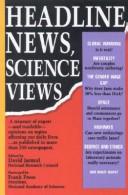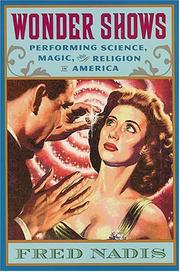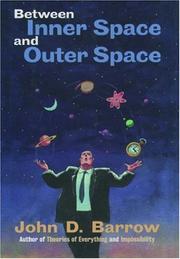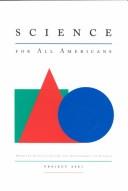| Listing 1 - 10 of 22 | << page >> |
Sort by
|
Book
ISBN: 2759822478 Year: 2018 Publisher: Les Ulis Cedex A, France : EDP Sciences,
Abstract | Keywords | Export | Availability | Bookmark
 Loading...
Loading...Choose an application
- Reference Manager
- EndNote
- RefWorks (Direct export to RefWorks)
De Fontenelle à Gaston Tissandier, la Vulgarisation trace son chemin, à travers les remous de l’Histoire, avec les abbés Nollet, Pluche et Moigno – soucieux de concilier religion et science – et les républicains Arago, Figuier, Flammarion, Meunier, Jules Verne et tant d’autres. Elle permet à un public de plus en plus varié, grâce aux progrès de la presse et de l’imprimerie, de suivre de près les découvertes scientifiques, mais aussi de comprendre les progrès techniques qui modifient la vie "idienne : le chemin de fer, l’électricité, les ascenseurs, la bicyclette et l’automobile, etc. Ce public peut même assister aux démonstrations, lors des grandes Expositions universelles qui éclairent le siècle. Des collections spécialisées voient le jour, Manuels Roret, Bibliothèque des Merveilles. Les premières revues périodiques de vulgarisation se multiplient. Cosmos et La Nature préfigurent les revues modernes. De grandes revues généralistes, la Revue des Deux Mondes, Le Magasin pittoresque, l’Illustration n’hésitent pas à publier des articles de vulgarisation.
Science --- Science news. --- News, Science --- Popularization of science --- Communication in science --- Journalism --- Technical writing --- History. --- Popularization

ISBN: 0309043840 0309044804 9786610211906 1280211903 0309582970 0585155321 9780585155326 9780309044806 9781280211904 6610211906 9780309582971 9780309043847 Year: 1991 Publisher: Washington, D.C. National Academy Press
Abstract | Keywords | Export | Availability | Bookmark
 Loading...
Loading...Choose an application
- Reference Manager
- EndNote
- RefWorks (Direct export to RefWorks)
Science news --- Science --- Technology --- Health --- Medical policy --- Physical Sciences & Mathematics --- Sciences - General --- Social aspects --- Public health --- News, Science --- Popularization of science --- Popularization --- Communication in science --- Journalism --- Technical writing
Book
ISBN: 9782759811601 9782759816958 2759816958 2759811603 Year: 2014 Publisher: Les Ulis EDP sciences
Abstract | Keywords | Export | Availability | Bookmark
 Loading...
Loading...Choose an application
- Reference Manager
- EndNote
- RefWorks (Direct export to RefWorks)
Guide pratique répondant aux questions des scientifiques souhaitant vulgariser leurs savoirs avec le plus grand nombre.
Science. --- Natural science --- Natural sciences --- Science of science --- Sciences --- Science news --- News, Science --- Popularization of science --- Science --- Communication in science --- Journalism --- Technical writing --- Popularization

ISBN: 0813541212 9780813541211 081353898X 9780813538983 0813535158 9780813535159 Year: 2005 Publisher: New Brunswick, N.J. Rutgers University Press
Abstract | Keywords | Export | Availability | Bookmark
 Loading...
Loading...Choose an application
- Reference Manager
- EndNote
- RefWorks (Direct export to RefWorks)
Imagine a stage full of black cats emitting electrical sparks, a man catching bullets with his teeth, or an evangelist jumping on a transformer to shoot bolts of lightning through his fingertips. These and other wild schemes were part of the repertoire of showmen who traveled from city to city, making presentations that blended science with myth and magic. In Wonder Shows, Fred Nadis offers a colorful history of these traveling magicians, inventors, popular science lecturers, and other presenters of “miracle science” who revealed science and technology to the public in awe-inspiring fashion. The book provides an innovative synthesis of the history of performance with a wider study of culture, science, and religion from the antebellum period to the present. It features a lively cast of characters, including electrical “wizards” Nikola Tesla and Thomas Alva Edison, vaudeville performers such as Harry Houdini, mind readers, UFO cultists, and practitioners of New Age science. All of these performers developed strategies for invoking cultural authority to back their visions of science and progress. The pseudo-science in their wonder shows helped promote a romantic worldview that called into question the absolute authority of scientific materialism while reaffirming the importance of human spirituality. Nadis argues that the sensation that these entertainers provided became an antidote to the alienation and dehumanization that accompanied the rise of modern America. Although most recent defenders of science are prone to reject wonder, considering it an ally of ignorance and superstition, Wonder Shows demonstrates that the public’s passion for magic and meaning is still very much alive. Today, sales continue to be made and allegiances won based on illusions that products are unique, singular, and at best, miraculous. Nadis establishes that contemporary showmen, corporate publicists, advertisers, and popular science lecturers are not that unlike the magicians and mesmerists of years ago.
Science news --- Magic shows --- Revivals --- Protracted meetings (Revivals) --- Revival (Religion) --- Evangelistic work --- Amusements --- News, Science --- Popularization of science --- Science --- Communication in science --- Journalism --- Technical writing --- History --- Popularization
Book
ISBN: 9004365974 9004365966 Year: 2018 Publisher: [S.l.] : BRILL,
Abstract | Keywords | Export | Availability | Bookmark
 Loading...
Loading...Choose an application
- Reference Manager
- EndNote
- RefWorks (Direct export to RefWorks)
In Presented Discourse in Popular Science , Olga A. Pilkington explores the forms and functions of the voices of scientists in books written for non-professionals. This study confirms the importance of considering presentation of discourse outside of literary fiction: popular science uses presented discourse in ways uncommon for fiction yet not conventional for non-fiction either. This analysis is an acknowledgement of the social consequences of popularization. Discourse presentation of scientists reconstructs the world of the scientific community as a human space but also projects back into it an image of the scientist the public wants to see. At the same time, Pilkington’s findings strengthen the view of popularization that rejects the notion of a strict divide between professional and popular science.
Science news. --- Scientists. --- Science. --- Natural science --- Natural sciences --- Science of science --- Sciences --- Professional employees --- News, Science --- Popularization of science --- Science --- Communication in science --- Journalism --- Technical writing --- Popularization
Book

ISBN: 9788523211813 Year: 2011 Publisher: SciELO Books - EDUFBA
Abstract | Keywords | Export | Availability | Bookmark
 Loading...
Loading...Choose an application
- Reference Manager
- EndNote
- RefWorks (Direct export to RefWorks)
Esta obra aborda a relação da ciência e sua divulgação, estabelecendo diálogos entre pesquisadores dos mais diversos temas sobre ciência e suas interfaces, levantando questões práticas, como a relação da ciência com a cultura, e analisando questões curiosas, como a presença da ciência nas músicas de Gilberto Gil e a abordagem que a mídia brasileira dá a assuntos como o bioetanol e as células-tronco.
Communication in science. --- Mass media in health education. --- Science news --- News, Science --- Popularization of science --- Science --- Communication in science --- Journalism --- Technical writing --- Health education --- Communication in research --- Science communication --- Science information --- Scientific communications --- Popularization --- SCIENCE

ISBN: 0191583162 0585129401 9780191583162 9780585129402 0198502540 9780198502548 Year: 1999 Publisher: [Place of publication not identified] Oxford University Press
Abstract | Keywords | Export | Availability | Bookmark
 Loading...
Loading...Choose an application
- Reference Manager
- EndNote
- RefWorks (Direct export to RefWorks)
Science --- Cosmology --- Science news --- Physical Sciences & Mathematics --- Sciences - General --- News, Science --- Popularization of science --- Communication in science --- Journalism --- Technical writing --- Natural science --- Natural sciences --- Science of science --- Sciences --- Philosophy --- Popularization --- Science news.
Book
ISBN: 1443853739 9781443853736 130616656X 9781306166560 1443849472 9781443849470 Year: 2013 Publisher: Newcastle upon Tyne Cambridge Scholars Publishing
Abstract | Keywords | Export | Availability | Bookmark
 Loading...
Loading...Choose an application
- Reference Manager
- EndNote
- RefWorks (Direct export to RefWorks)
This book presents a series of cutting edge research studies in the field of public understanding of science, with particular focus on aspects of informal science education. In addition to providing up-to-date overviews of current thinking about how best to conceptualise the field, it offers a range of primary research studies examining informal public venues of science and mediations of scientific knowledge and representation. With contributions from some leading international researchers, the book provides discussions and case studies addressing the USA, UK and Europe, Africa and India, offe
Communication in science --- Science --- Science news --- Science in mass media --- Science in literature --- Popular culture --- Mass media --- News, Science --- Popularization of science --- Journalism --- Technical writing --- Natural science --- Natural sciences --- Science of science --- Sciences --- Public opinion --- Social aspects --- Popularization
Book
ISBN: 030022107X 9780300221077 0300197551 9780300197556 Year: 2016 Publisher: New Haven
Abstract | Keywords | Export | Availability | Bookmark
 Loading...
Loading...Choose an application
- Reference Manager
- EndNote
- RefWorks (Direct export to RefWorks)
Here is the essential how-to guide for communicating scientific research and discoveries online, ideal for journalists, researchers, and public information officers looking to reach a wide lay audience. Drawing on the cumulative experience of twenty-seven of the greatest minds in scientific communication, this invaluable handbook targets the specific questions and concerns of the scientific community, offering help in a wide range of digital areas, including blogging, creating podcasts, tweeting, and more. With step-by-step guidance and one-stop expertise, this is the book every scientist, science writer, and practitioner needs to approach the Wild West of the Web with knowledge and confidence.
Communication in science. --- Science news --- News, Science --- Popularization of science --- Science --- Communication in science --- Journalism --- Technical writing --- Communication in research --- Science communication --- Science information --- Scientific communications --- Popularization --- Sciences --- Information scientifique --- Blogs --- Blogs. --- Vulgarisation --- Blogues

ISBN: 1280605588 0198023235 9786610605583 0195361865 1429415231 9780198023234 0195067703 9780195067705 0195067711 9780195067712 9781280605581 6610605580 9780195361865 9781429415231 0199879230 0197710875 9780199879236 Year: 1990 Publisher: New York Oxford University Press
Abstract | Keywords | Export | Availability | Bookmark
 Loading...
Loading...Choose an application
- Reference Manager
- EndNote
- RefWorks (Direct export to RefWorks)
In order to compete in the modern world, any society today must rank education in science, mathematics, & technology as one of its highest priorities. It's a sad but true fact, however, that most Americans are not scientifically literate. International studies of educational performance reveal that US students consistently rank near the bottom in science & mathematics. The latest study of the National Assessment of Educational Progress has found that despite some small gains recently, the average performance of 17-year-olds in 1986 remained lower than it had been in 1969. As the world approaches the 21st century, American schools seem to be stuck in the Victorian age. In this book, F. James Rutherford and Andrew Ahlgren tackle this problem.
Engineering --- Science news. --- Science --- Science. --- Technology. --- Applied science --- Arts, Useful --- Science, Applied --- Useful arts --- Industrial arts --- Material culture --- Natural science --- Natural sciences --- Science of science --- Sciences --- Science education --- Scientific education --- News, Science --- Popularization of science --- Communication in science --- Journalism --- Technical writing --- Study and teaching. --- Popularization
| Listing 1 - 10 of 22 | << page >> |
Sort by
|

 Search
Search Feedback
Feedback About UniCat
About UniCat  Help
Help News
News